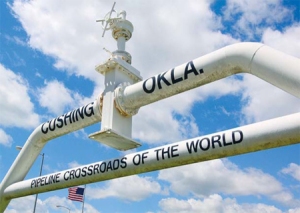
TransCanada Corporation has announced
plans to add 6.2 million barrels of new crude oil storage at its Cushing
terminal in Oklahoma.
The new storage will be owned by M2 Infrastructure and operated by TransCanada. Under the terms of the memorandum of understanding, M2 has an option to build up to 20 million barrels of storage, which would be built in subsequent phases.
The project and option to expand are subject to completion of definitive agreements between the parties as well as acquiring the required approvals and land rights. Construction of the crude storage is expected to start in late 2017.
M2 will work with Matrix Global Holdings to sell storage capacity to its customers through on-line auctions for futures contracts and/or physical forward agreements.
J. Robert Collings, Jr, co-founder and manager of M2 Infrastructure, says: 'This project's unique position in Cushing, combined with the innovative excellence of Matrix, should provide the lowest cost, highest throughput, most liquid and most connected storage solution in the midcontinent – eliminating costly limitations of alternative storage programmes.'
The new storage will be owned by M2 Infrastructure and operated by TransCanada. Under the terms of the memorandum of understanding, M2 has an option to build up to 20 million barrels of storage, which would be built in subsequent phases.
The project and option to expand are subject to completion of definitive agreements between the parties as well as acquiring the required approvals and land rights. Construction of the crude storage is expected to start in late 2017.
M2 will work with Matrix Global Holdings to sell storage capacity to its customers through on-line auctions for futures contracts and/or physical forward agreements.
J. Robert Collings, Jr, co-founder and manager of M2 Infrastructure, says: 'This project's unique position in Cushing, combined with the innovative excellence of Matrix, should provide the lowest cost, highest throughput, most liquid and most connected storage solution in the midcontinent – eliminating costly limitations of alternative storage programmes.'
No comments:
Post a Comment